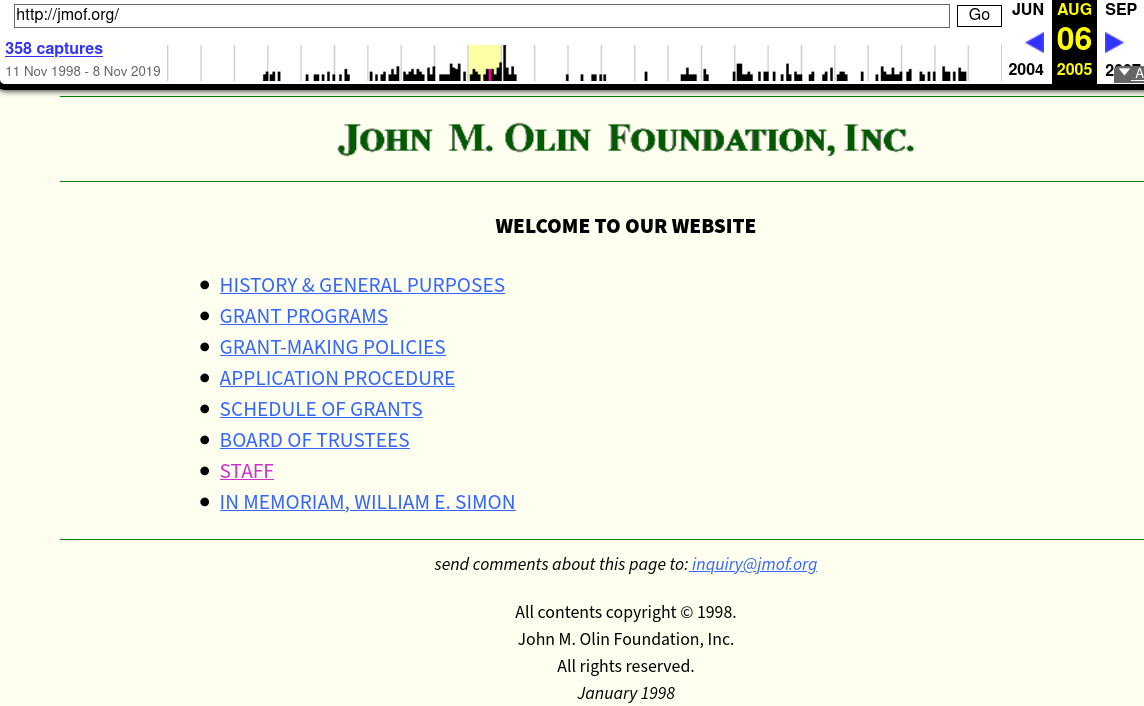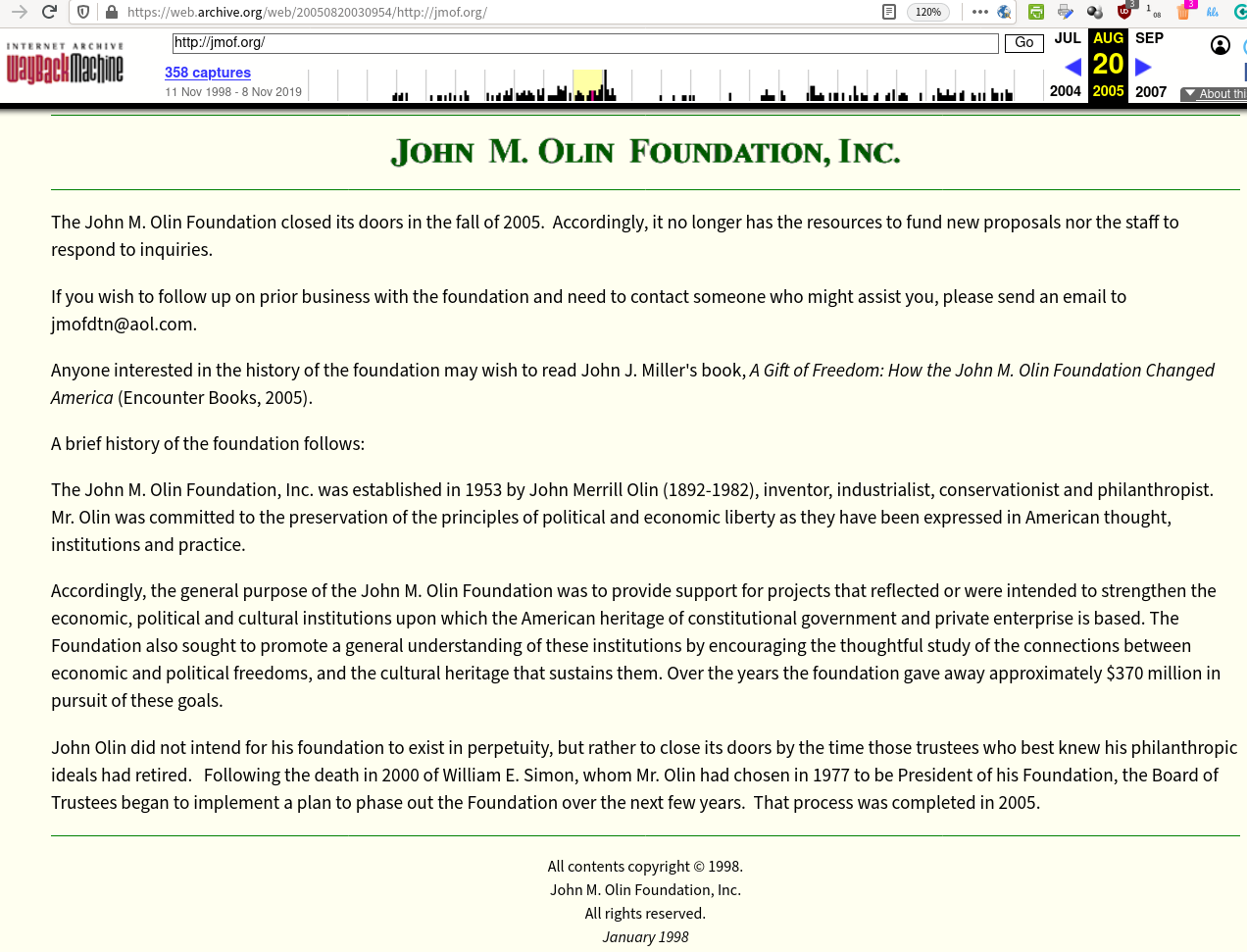Website: http://jmof.org/ | inactive | That domain subsequently appears to have been repurchased by a non-affiliated third-party.
One of the last "Olin Foundation" Internet Archive snapshots is found 2005-08-06.
-
Internet Archive, 2005-08-06.
[Image source. Click image to open in new window.]
Subsequent Internet Archive snapshots, e.g. 2005-08-20, contain the following statement.
John M. Olin Foundation
The John M. Olin Foundation closed its doors in the fall of 2005. Accordingly, it no longer has the resources to fund new proposals nor the staff to respond to inquiries.
If you wish to follow up on prior business with the foundation and need to contact someone who might assist you, please send an email to jmofdtn@aol.com.
Anyone interested in the history of the Foundation may wish to read John J. Miller's book, "A Gift of Freedom: How the John M. Olin Foundation Changed America" (Encounter Books, 2005).
A brief history of the foundation follows:
The John M. Olin Foundation, Inc. was established in 1953 by John Merrill Olin (1892-1982), inventor, industrialist, conservationist and philanthropist. Mr. Olin was committed to the preservation of the principles of political and economic liberty as they have been expressed in American thought, institutions and practice.
Accordingly, the general purpose of the John M. Olin Foundation was to provide support for projects that reflected or were intended to strengthen the economic, political and cultural institutions upon which the American heritage of constitutional government and private enterprise is based. The Foundation also sought to promote a general understanding of these institutions by encouraging the thoughtful study of the connections between economic and political freedoms, and the cultural heritage that sustains them. Over the years the foundation gave away approximately $370 million in pursuit of these goals.
John Olin did not intend for his foundation to exist in perpetuity, but rather to close its doors by the time those trustees who best knew his philanthropic ideals had retired. Following the death in 2000 of William E. Simon, whom Mr. Olin had chosen in 1977 to be President of his Foundation, the Board of Trustees began to implement a plan to phase out the Foundation over the next few years. That process was completed in 2005.
Internet Archive, 2005-08-20.
[Image source. Click image to open in new window.]
The John M. Olin Foundation was a conservative American grant-making foundation established in 1953 by John M. Olin, president of the Olin Industries chemical and munitions manufacturing businesses. Unlike most other foundations, it was charged to spend all of its assets within a generation of Olin's death, for fear of mission drift over time and to preserve donor intent. It made its last grant in the summer of 2005 and officially disbanded on November 29, 2005. It had disbursed over $370 million in funding, primarily to conservative think tanks, media outlets, and law programs at influential universities. It is most notable for its early support and funding of the law and economics movement and the Federalist Society. "All in all, the Federalist Society has been one of the best investments the Foundation ever made," wrote the Olin Foundation to its trustees in 2003.
Mission statement
According to the official website, "the general purpose of the John M. Olin Foundation is to provide support for projects that reflect or are intended to strengthen the economic, political and cultural institutions upon which the American heritage of constitutional government and private enterprise is based. The Olin Foundation also seeks to promote a general understanding of these institutions by encouraging the thoughtful study of the connections between economic and political freedoms, and the cultural heritage that sustains them."
History
The fund was largely inactive until 1969, when John M. Olin was disturbed by the Willard Straight Hall takeover at his alma mater, Cornell University. At the age of 80, he decided that he must pour his time and resources into preserving the free market system.
The Olin Foundation is most notable for its early support and funding of the law and economics movement, a discipline that applies incentive-based thinking and cost-benefit analysis to the field of legal theory. Olin believed that law schools have a disproportionately large impact on society given their size and to this end decided to focus the majority of his funding there.
The Executive Director of the John M. Olin Foundation in its early years was conservative activist Michael S. Joyce, who left to head the similar Bradley Foundation. William E. Simon, a leverage buyout pioneer who was United States Secretary of the Treasury under Presidents Richard Nixon and Gerald Ford, was President of the Olin Foundation from 1977 until his death in 2000. He frequently discussed the Olin Foundation's commitment to supporting the "counter-intelligentsia." Conservative scholar James Piereson was the last Executive Director and Secretary.
The Olin Foundation supported conservative thinkers such as Heather Lynn MacDonald of the Manhattan Institute; Heather MacDonald is the John M. Olin Fellow at this New York City-based institution. In 2005, following longstanding plans, the Olin Foundation announced its final grants and closed its doors.
The Olin Foundation closed in the same year as the Franklin W. Olin Foundation, which was established by John Olin's father, Franklin W. Olin. The Franklin W. Olin Foundation also shut down for donor intent reasons, but the two foundations were entirely independent and unrelated, except for the family connection of their founders.
According to the Philanthropy Roundtable, the Olin Foundation "dispensed hundreds of millions of dollars to scholars, think tanks, publications, and other organizations" and "shaped the direction and aided the growth of the modern conservative movement that first sprang into visibility in the 1980s." According to the New York Observer, the Olin Foundation distributed "grants to conservative think tanks and intellectuals -- the architects of today's sprawling right-wing movement -- for a quarter-century."
Notable persons
- James Piereson -- past Executive Director and Board member
- Peter M. Flanigan -- past Director
- Charles F. Knight -- past Director
Sponsored professorships
There are several dozen John M. Olin Professors at universities and law schools around the world, including:
- John M. Olin Professor at Fordham University (formerly Ernest van den Haag)
- John M. Olin Professor at George Mason University (currently Walter E. Williams)
- John M. Olin Professor at Yale Law School (currently George L. Priest)
- John M. Olin Professor at Georgetown University (formerly Walter F. Berns)
Publications
- Collegiate Network
- Commentary
- The National Interest
- The New Criterion
Additional Reading
Return to Persagen.com

